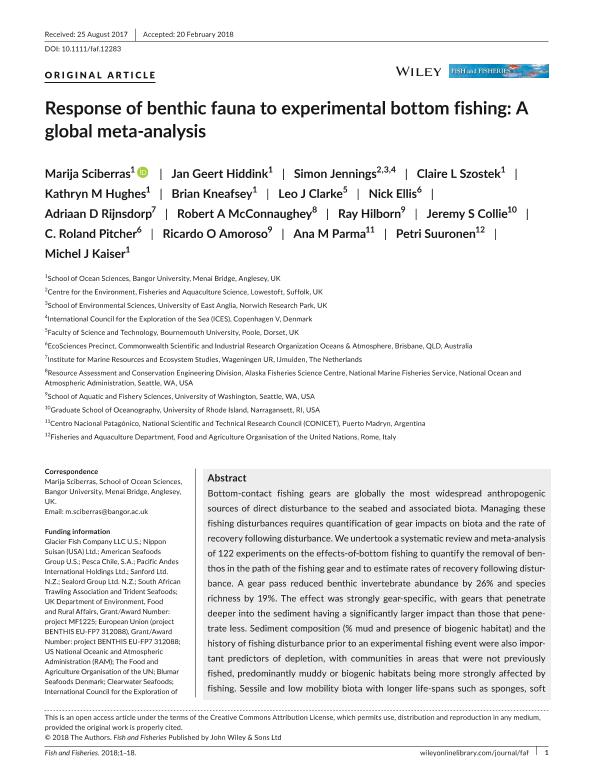Mostrar el registro sencillo del ítem
dc.contributor.author
Sciberras, Marija
dc.contributor.author
Hiddink, Jan Geert
dc.contributor.author
Jennings, Simon
dc.contributor.author
Szostek, Claire L.
dc.contributor.author
Hughes, Kathryn M.
dc.contributor.author
Kneafsey, Brian
dc.contributor.author
Clarke, Leo J.
dc.contributor.author
Ellis, Nick
dc.contributor.author
Rijnsdorp, Adriaan D.
dc.contributor.author
McConnaughey, Robert A.
dc.contributor.author
Hilborn, Ray
dc.contributor.author
Collie, Jeremy S.
dc.contributor.author
Pitcher, Clifford Roland

dc.contributor.author
Amoroso, Ricardo Oscar

dc.contributor.author
Parma, Ana María

dc.contributor.author
Suuronen, Petri
dc.contributor.author
Kaiser, Michel J.
dc.date.available
2020-02-06T15:11:34Z
dc.date.issued
2018-07
dc.identifier.citation
Sciberras, Marija; Hiddink, Jan Geert; Jennings, Simon; Szostek, Claire L.; Hughes, Kathryn M.; et al.; Response of benthic fauna to experimental bottom fishing: A global meta-analysis; Wiley Blackwell Publishing, Inc; Fish And Fisheries; 19; 4; 7-2018; 698-715
dc.identifier.issn
1467-2960
dc.identifier.uri
http://hdl.handle.net/11336/96816
dc.description.abstract
Bottom-contact fishing gears are globally the most widespread anthropogenic sources of direct disturbance to the seabed and associated biota. Managing these fishing disturbances requires quantification of gear impacts on biota and the rate of recovery following disturbance. We undertook a systematic review and meta-analysis of 122 experiments on the effects-of-bottom fishing to quantify the removal of benthos in the path of the fishing gear and to estimate rates of recovery following disturbance. A gear pass reduced benthic invertebrate abundance by 26% and species richness by 19%. The effect was strongly gear-specific, with gears that penetrate deeper into the sediment having a significantly larger impact than those that penetrate less. Sediment composition (% mud and presence of biogenic habitat) and the history of fishing disturbance prior to an experimental fishing event were also important predictors of depletion, with communities in areas that were not previously fished, predominantly muddy or biogenic habitats being more strongly affected by fishing. Sessile and low mobility biota with longer life-spans such as sponges, soft corals and bivalves took much longer to recover after fishing (>3 year) than mobile biota with shorter life-spans such as polychaetes and malacostracans (<1 year). This meta-analysis provides insights into the dynamics of recovery. Our estimates of depletion along with estimates of recovery rates and large-scale, high-resolution maps of fishing frequency and habitat will support more rigorous assessment of the environmental impacts of bottom-contact gears, thus supporting better informed choices in trade-offs between environmental impacts and fish production.
dc.format
application/pdf
dc.language.iso
eng
dc.publisher
Wiley Blackwell Publishing, Inc

dc.rights
info:eu-repo/semantics/openAccess
dc.rights.uri
https://creativecommons.org/licenses/by-nc-sa/2.5/ar/
dc.subject
DREDGING
dc.subject
EFFECTS OF TRAWLING
dc.subject
FISHING IMPACTS
dc.subject
INVERTEBRATE COMMUNITIES
dc.subject
SYSTEMATIC REVIEW
dc.subject
TAXONOMIC ANALYSIS
dc.subject.classification
Conservación de la Biodiversidad

dc.subject.classification
Ciencias Biológicas

dc.subject.classification
CIENCIAS NATURALES Y EXACTAS

dc.title
Response of benthic fauna to experimental bottom fishing: A global meta-analysis
dc.type
info:eu-repo/semantics/article
dc.type
info:ar-repo/semantics/artículo
dc.type
info:eu-repo/semantics/publishedVersion
dc.date.updated
2019-10-22T15:54:02Z
dc.journal.volume
19
dc.journal.number
4
dc.journal.pagination
698-715
dc.journal.pais
Reino Unido

dc.journal.ciudad
Londres
dc.description.fil
Fil: Sciberras, Marija. Bangor University;
dc.description.fil
Fil: Hiddink, Jan Geert. Bangor University;
dc.description.fil
Fil: Jennings, Simon. University of East Anglia; Reino Unido. Centre For The Environment Fisheries And Aquaculture Science; . International Council For The Exploration Of The Sea (ices);
dc.description.fil
Fil: Szostek, Claire L. Bangor University;
dc.description.fil
Fil: Hughes, Kathryn M. Bangor University;
dc.description.fil
Fil: Kneafsey, Brian. Bangor University;
dc.description.fil
Fil: Clarke, Leo J. Bournemouth University;
dc.description.fil
Fil: Ellis, Nick. Commonwealth Scientific And Industrial Research Organization Oceans And Atmosphere; Australia
dc.description.fil
Fil: Rijnsdorp, Adriaan D. Wageningen University And Research Centre;
dc.description.fil
Fil: McConnaughey, Robert A. Noaa National Marine Fisheries Service Northwest Regional Office;
dc.description.fil
Fil: Hilborn, Ray. University Of Washington, Seattle;
dc.description.fil
Fil: Collie, Jeremy S. University Of Rhode Island;
dc.description.fil
Fil: Pitcher, C. Roland. Commonwealth Scientific And Industrial Research Organization Oceans And Atmosphere; Australia
dc.description.fil
Fil: Amoroso, Ricardo O. University Of Washington, Seattle;
dc.description.fil
Fil: Parma, Ana María. Consejo Nacional de Investigaciones Científicas y Técnicas. Centro Científico Tecnológico Conicet - Centro Nacional Patagónico; Argentina
dc.description.fil
Fil: Suuronen, Petri. Food And Agriculture Organization Of The United Nations;
dc.description.fil
Fil: Kaiser, Michel J. Bangor University;
dc.journal.title
Fish And Fisheries

dc.relation.alternativeid
info:eu-repo/semantics/altIdentifier/doi/http://dx.doi.org/10.1111/faf.12283
dc.relation.alternativeid
info:eu-repo/semantics/altIdentifier/url/https://onlinelibrary.wiley.com/doi/full/10.1111/faf.12283
Archivos asociados
